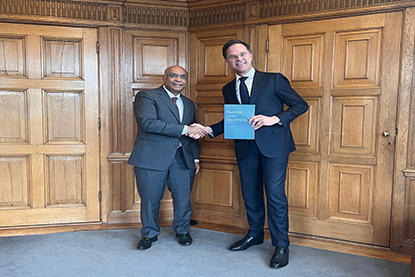External evaluation of the WRR
Once every five years, the Netherlands Scientific Council for Government Policy (WRR) is being evaluated. How is the WRR functioning in the current environment? To what extent is it performing its tasks effectively and what impact are its activities having on policy, science and society? An external evaluation committee is brought in to consider these and other relevant questions. The most recent committee, chaired by Vinod Subramaniam and focusing on the council term 2018-2022, concludes in its evaluation report Ruimte voor bezinning that the core responsibility of the WRR is to provide space for reflection. The council’s products help policymakers in Dutch central government and wider society to provide that space. On 12 April, the report was presented to the Prime Minister of the Netherlands.
To ensure that the WRR can continue to provide the necessary space for reflection in the future, the committee has included six clusters of recommendations in its evaluation report:
- Maintain and strengthen the unique role of the WRR
- Make it clear what roles the WRR does and does not aim to fulfil
- Strengthen the impact of advice
- Bear current pressures on the government in mind
- Maintain multiple dimensions of diversity
- Monitor the robustness of the internal organization
Working methods
Every five years, an independent committee of experts evaluates the performance of the WRR. In addition to acquainting itself with various WRR publications and relevant documents, the latest committee spoke to forty people. In preparation for the evaluation, the WRR wrote an internal assessment. This provided the evaluation committee with much of the relevant background information it needed to carry out its duties. The WRR attaches great importance to this internal assessment as a way of critically evaluating its own performance.
Composition of the evaluation committee
The chair of the committee was Prof. Vinod Subramaniam, President of the Executive Board of the University of Twente. The members of the committee were Prof. Semiha Denktaş, Professor of Health Psychology/Chief Diversity Officer at Erasmus University Rotterdam, Jetta Klijnsma, King’s Commissioner of the Province of Drenthe, and Prof. Geertrui Van Overwalle, Professor of Intellectual Property Law at KU Leuven. The committee was supported by Dr Gijsbert Werner.
